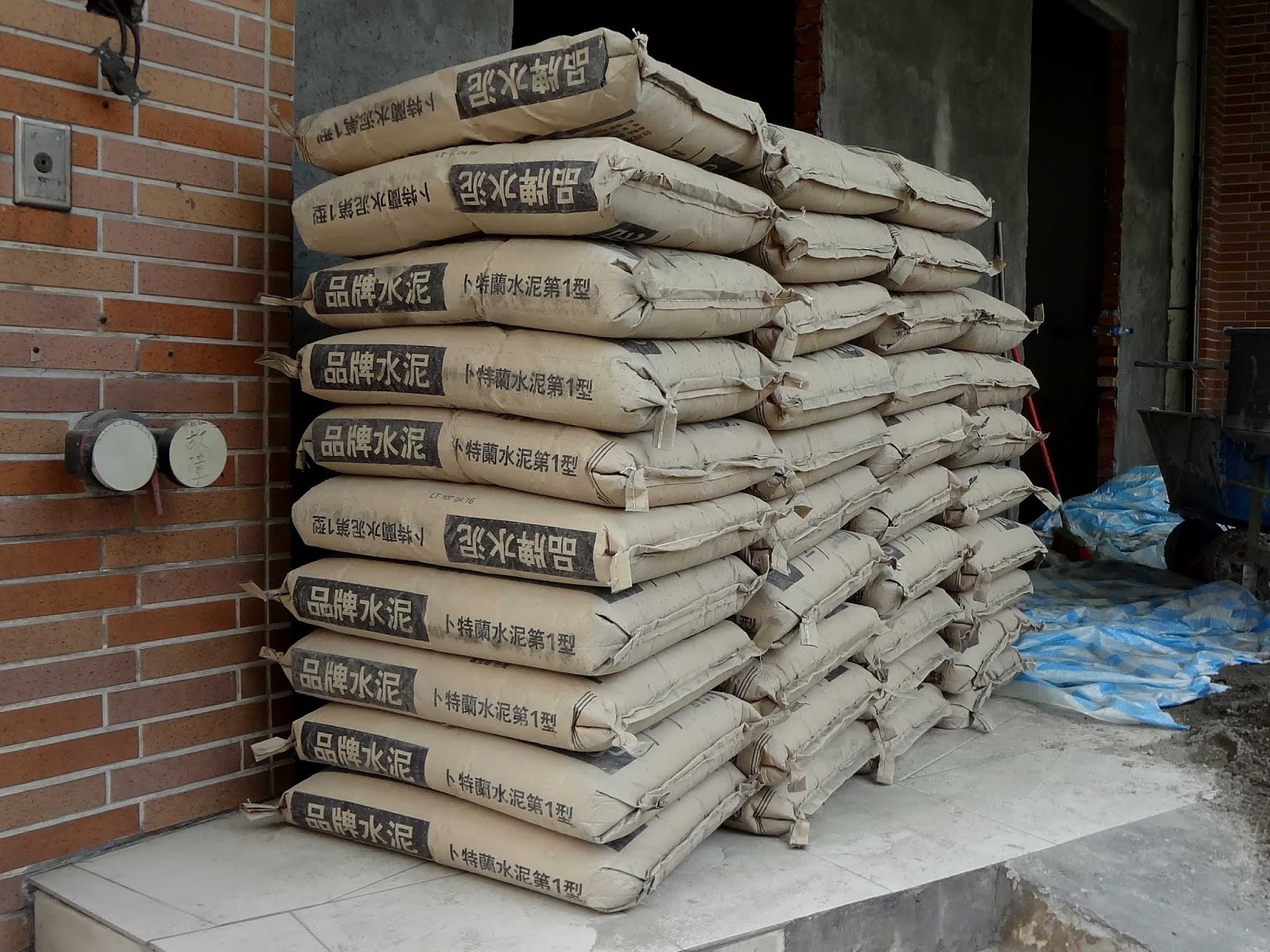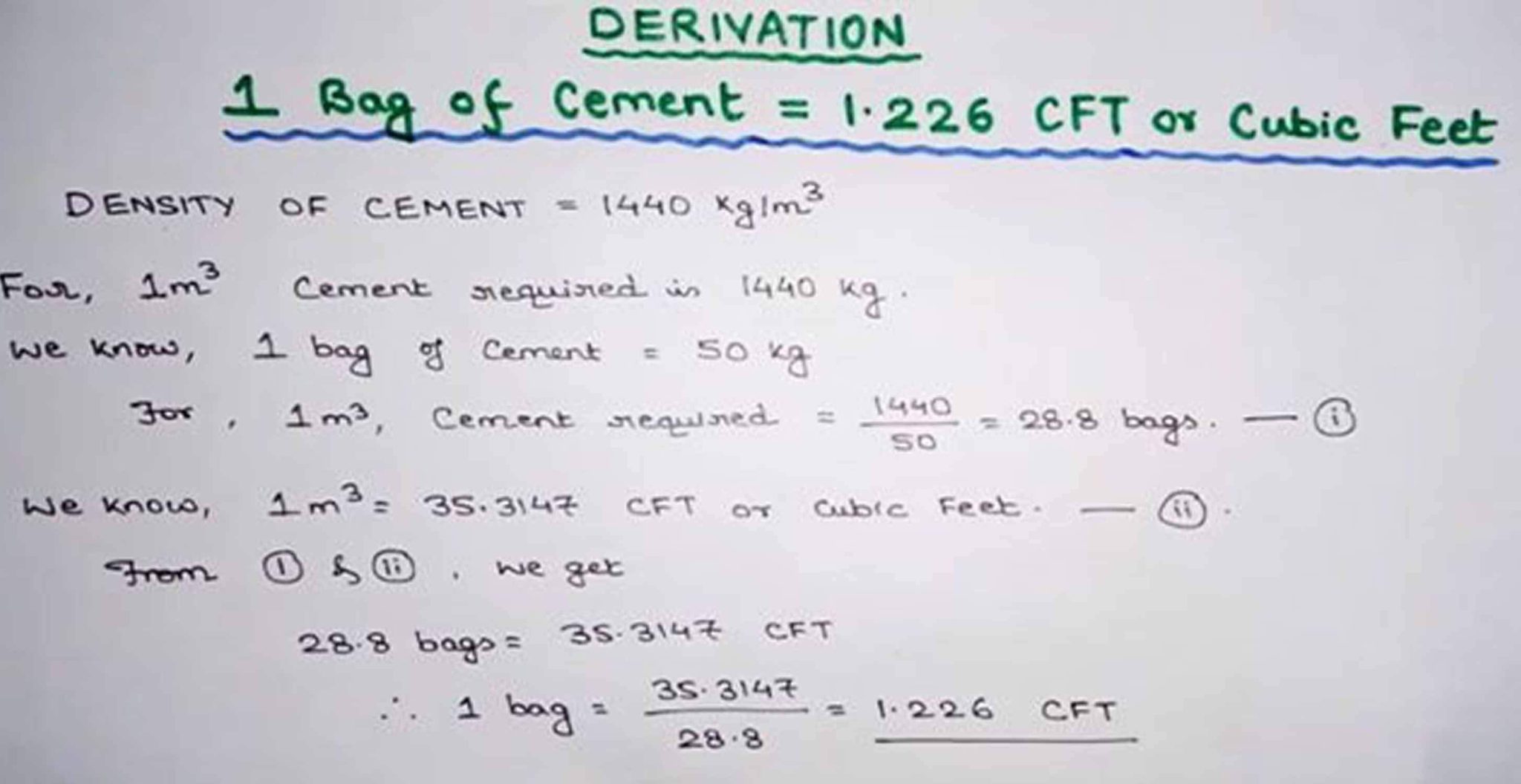
How To Calculate Cement Bags Weight of 1 bag cement = 50 kg. Mighxdehog
Density of cement. 1440 kg/ meter cube. Now, we need to calculate volume of one bag of cement. So, Volume of Cement: = Mass/ Density. =50/1440. = 0.0347 m3. Also you can convert this volume from cubic meter to cubic feet, Just you have to multiply the volume of 1 bag of cement by 35.3147.

Volume of Cement Calculate one cement bag volume How to calculate volume of 1 bag cement
The calculator will indicate the number of bags you will need to build a 4 inch or 6 inch slab. (all yields are approximate and do not allow for uneven substrate, waste, etc.) Enter Number of Square Feet Desired: For a 4" Slab: Number of 40 lb. bags: Number of 50 lb. bags: Number of 60 lb. bags: Number of 80 lb. Bags: For a 6" Slab:

Calculating the volume of cement bags in cubic meter, cubic feet, & in liters. PARAM VISIONS
25th August 2023 How Many Cubic Feet in a Bag of Concrete? Important Point How many cubic feet are in a pack of concrete: A 60-pound bag of concrete gives you - and when mixed with 2.5 quarts of water yields forty-five cubic feet of concrete. To get enough concrete for one cubic foot, you will need 2.2 bags of 60-pound concrete.

Calculate number of cement bags in one cubic meter Cement bags estimation YouTube
Convert the weight of the bag to the volume. Divide 27 cubic feet of concrete in a cubic yard by the volume of the concrete bag. Add 5%-10% additional material for some waste or spills. Find the number of concrete bags in the most popular sizes in the chart below: Bag Size.

Calculation of one bag of cement equal to how many cubic feet COMMON DOUBT in quantity analysis
Procedure To Calculate Cement Bags In 1 Cubic Meter Let us consider the nominal mix is 1:2:4 Loss of cement is considered as 2% The output of the mix is considered to 67% To achieve 1 cum output, we need 1/0.67 = 1.49 say 1.50 cum dry mix. Now add the wastage of 2%, i.e (1.50 + 0.02) = 1.52 cum.

how to calculate volume of one bag of cement YouTube
2 Volume of One 50 KG Cement Bag in Cubic Meters (CUM) 3 Volume of One 50 KG Cement Bag in Cubic Feet (CFT) 4 Calculate the Volume of A Cement Bag in Litres 5 History of Cement 6 Conclusion 7 Reference Video 8 FAQ 8.1 What is cement volume? 8.2 How is cement volume measured? 8.3 How much volume does one bag of cement occupy?

cement bag in cubic meter/ foot. volume of one bag cement.एक क्यूबिक फुट में कितना बैग सिमेंट
The method of calculating the volume of 1 bag of cement are as follows. The density of cement is 1440 kg/m3. It means in one cubic metre the quantity of the cement is 1440 kg. We know the formula of density Density = Mass/ volume Density of cemen t = ( Mass of one bag cement/volume of one bag cement)

How to Calculate 1 Bag Cement Quantity in Cubic feet YouTube
Density of cement = 1440 kg/m31 m3 =1440 kg cement1 bag cement = 50kg1 m3 = 1440/50 = 28.8 bags1 m3 = 35.314 cft28.8 bags = 35.314 cft1 bag of cement = 35.3.

How to Calculate Volume of Cement Bag. YouTube
It is an uncomplicated form of calculating the volume of a 50kg cement bag. So, let's see how it is! The formula is - Density - Mass/Volume. ∴ The density of Cement = (Mass of cement bag/Volume of cement bag) ∴ Volume = Mass of Cement/Density of Cement ∴ Volume = [ (50 kg)/ (1440 kg/m³)] When you do this, you will get the result of 0.034722 m³.

How to Calculate Volume Of One Cement Bag In Cubic meter and Cubic Feet YouTube
1. Formula and Unit of Volume. 2. One Bag (50kg) of cement volume in cubic feet and cubic meters. 3. Mathematical Examples. Let's know the basic thing that you need to remember before calculating the volume of cement. Volume refers to the amount of space that an object or substance occupies in three-dimensional space.

Calculation of Volume of Cement Bag🔥🔥50 Kg Cement Bag Volume in Cubic Meter,Cubic Feet and
Here we need to calculate the number of bags first. ∴ Number of cement bags = 1440 (kg/m³)/50 (kg) ∴ Number of cement bags = 28.8 91/m³ By this, we know the total number of bags in one cubic meter. Here, one metric cube (1 m³) is equal to 35.314 Cubic feet. Now, it can be: 1 = 35.314 (C.ft/m³) Thus, 35.314 (C.ft/m³) = 28.8 (1/m³)

How to calculate Volume of one Cement Bag (IN CUBIC METER & CUBIC FEET) // cement in cum YouTube
The basic things you should know to calculate the volume of 1 bag of cement are, Cement bag density = 1440 kg/ m3 Weight of 1 bag of cement = 50 kg 1 m³ = 35.3147 cubic feet 1 m³ = 10³ liters YOU MAY ALSO READ VOLUME and SIZE of 40kg, 30kg, 25kg and 20kg CEMENT BAG

Volume of a 80 Lb Bag of Concrete in Cubic Yard & Cubic Foot CivilStep
How many cubic feet are in a bag of concrete? In United States, based on Imperial measurement system, 1 cubic yard is unit of measurement of volume represented by 3 feet long by 3 feet wide by 3 feet depth such as 3'×3'×3′ = 27 cubic feet, so 1 cubic yard is equal to 27 cubic feet.

How Much CFT in One Bag Cement? Volume Of Cement Bag In Cubic Feet YouTube
Calculate the amount you need for different volume and mix ratios of concrete.. An 80-pound bag of concrete yields 0.60 cubic feet, or 0.0222 cubic yards, covering roughly 3.6 square feet up to a typical depth of 2 inches for excavation or backfills, and 1.66 bags of 80-pound concrete will yield 1 cubic foot of landfill..

How many Cement Bags Required in 1 cubic meter How to Calculate cement bags in 1 cubic meter
Calculation Result 0.009 cubic feet or 0.000 cubic yards or 0.000 cubic meters if pre-mixed concrete*, it is 1.231 lbs or 0.558 kgs if 60 lbs per bag, it is 0.021 bags if 80 lbs per bag, it is 0.015 bags Concrete Weight Calculator

Density Of Cement Formula And Volume Of Cement Bag In Cubic Meters Engineering Discoveries
This concrete calculator will help you determine the volume of concrete you need in cubic yards, cubic feet, and cubic meters. It also calculates the number of 40lb, 60lb, or 80lb bags of concrete needed, and an estimated cost for the concrete. You can calculate how much concrete you will need for concrete slabs, walls, stairs, footings.